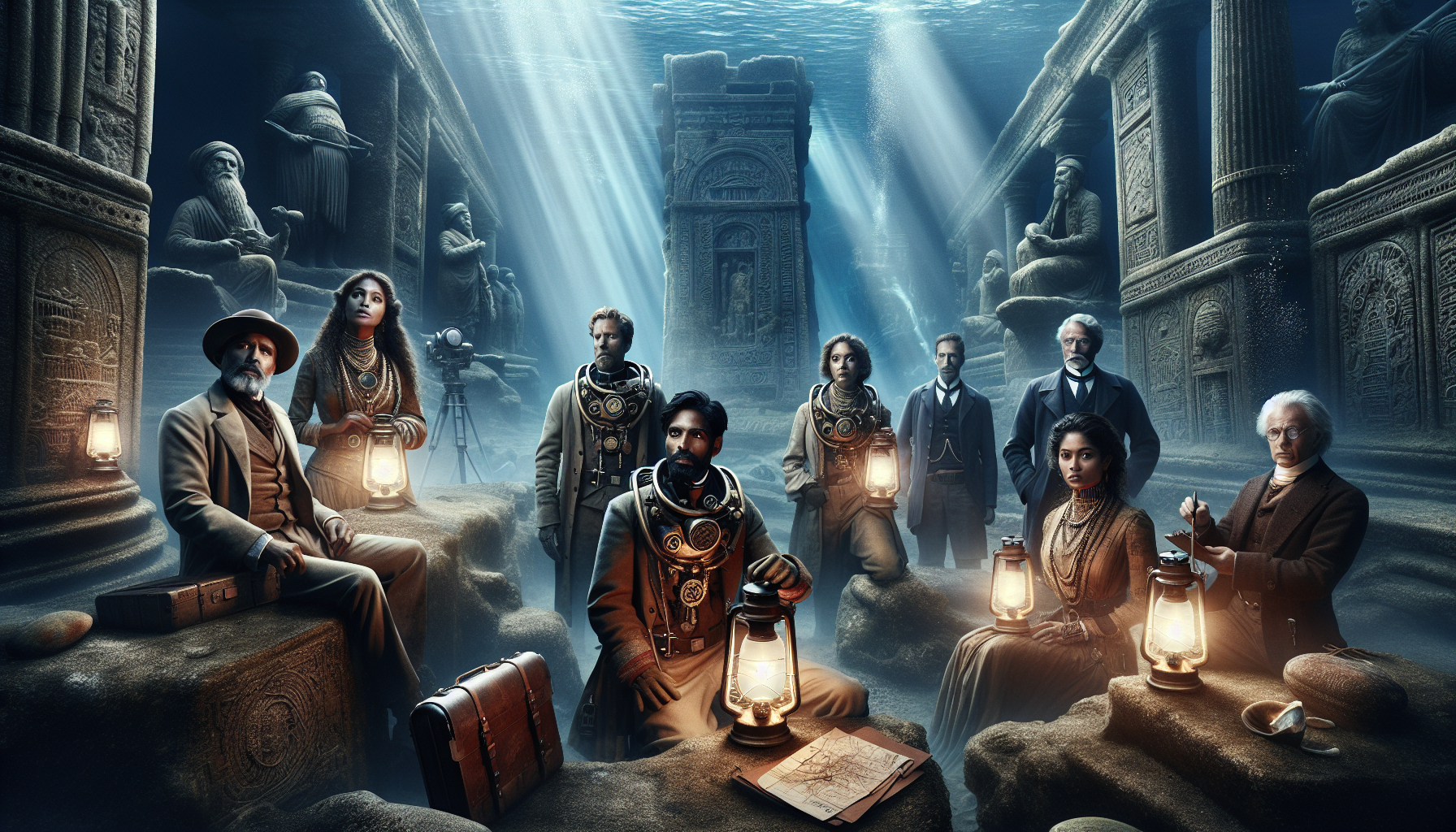In the annals of human history, few tales captivate the imagination as profoundly as the legend of Atlantis. Described by the ancient philosopher Plato as a formidable and advanced civilization that vanished beneath the waves in a single day and night, Atlantis has fueled countless theories and inspired explorers for centuries. But beyond the realm of myth and legend, could there be a kernel of truth to this ancient narrative? As we delve into the 19th-century scientific breakthroughs, we unearth tantalizing clues that might bring us closer to understanding the true story behind Atlantis—a story that has remained shrouded in mystery and speculation for millennia. 🌊
The 19th century was a period of remarkable progress and discovery. As scientists and explorers pushed the boundaries of what was known about our planet, they uncovered pieces of the past that reshaped our understanding of history and geography. The fascination with Atlantis during this era was not merely a fanciful pursuit; it was driven by the age’s intellectual curiosity and a desire to reconcile ancient texts with emerging scientific evidence. This period saw the rise of geology, archaeology, and oceanography as rigorous sciences, each contributing to a deeper exploration of the Earth’s secrets. As we journey through these groundbreaking discoveries, we will explore how they contributed to the enduring allure of Atlantis.
At the heart of this exploration is the question: Could Atlantis have been a real place, perhaps an island swallowed by natural cataclysms or a misinterpretation of an existing civilization? To answer this, we must examine the burgeoning field of geology in the 19th century. Scientists of the time, such as Charles Lyell, laid the groundwork for understanding the Earth’s dynamic processes, offering insights into how landscapes can change drastically over time. These geological principles challenged traditional timelines and provided a scientific basis for considering the possibility of sunken lands. We will delve into these theories and examine how they fed into the Atlantis discourse, inspiring both skeptics and believers alike.
Moreover, the advent of archaeology opened new vistas for understanding ancient civilizations. As excavations revealed lost cities and forgotten cultures, the 19th century was rife with speculation about the remnants of Atlantis potentially lying beneath our seas or deserts. The discovery of Troy, once thought to be purely mythical, emboldened explorers and scholars to consider that other legendary places, like Atlantis, might also await discovery. This era was a time when the line between myth and history blurred, and we will explore key archaeological findings that sparked renewed interest in the search for Atlantis, providing fodder for debates that continue to this day.
Finally, the field of oceanography began to take shape during this period, providing the tools to explore the ocean depths like never before. With the development of technologies such as the deep-sea sounding machine, scientists gained unprecedented insights into the underwater topography. These advancements fueled imaginations and theories about submerged continents and the possibility of entire civilizations hidden beneath the waves. By examining these technological strides and their implications, we aim to uncover how they shaped contemporary views on Atlantis and why this enigmatic story continues to resonate in modern scientific inquiries.
As we embark on this journey through the 19th-century scientific landscape, prepare to be transported into a world where myth meets science, and age-old mysteries find new light. The quest to uncover Atlantis is not just about finding a lost city; it is about understanding the complexities of our planet and the human spirit’s relentless pursuit of knowledge. Join us as we dive into the depths of history and discovery, navigating through groundbreaking revelations that continue to inspire and intrigue. The story of Atlantis awaits—are you ready to explore? 🧭
The Origins of the Atlantis Myth
The story of Atlantis has captivated imaginations for centuries, often sitting at the intersection of myth, philosophy, and speculative history. The origins of this mysterious lost city can be traced back to ancient Greek philosophy, particularly through the works of the philosopher Plato. In his dialogues “Timaeus” and “Critias,” Plato introduces Atlantis as a powerful and technologically advanced civilization that existed approximately 9,000 years before his time. According to Plato, Atlantis was located beyond the “Pillars of Hercules,” now commonly known as the Strait of Gibraltar, and was a formidable force that eventually succumbed to divine punishment, sinking into the ocean.
Plato’s portrayal of Atlantis was primarily intended as a moral allegory, serving to illustrate the consequences of hubris and the deterioration of a society due to greed and power. However, the vivid descriptions and detailed accounts of Atlantis’ architecture, society, and downfall have intrigued historians, archaeologists, and adventurers, sparking debates about its possible existence and location. Some argue that Atlantis was purely fictional, a figment of Plato’s imagination. Others propose that it might have been based on real events or locations, such as the Minoan civilization on Crete, which suffered a catastrophic volcanic eruption.
In the 19th century, the fascination with Atlantis took on new dimensions as scholars and explorers began to approach the legend with a scientific lens. This era marked a significant shift in how Atlantis was perceived, moving from myth to a subject of serious inquiry. Advances in archaeology, geology, and oceanography provided tools and methodologies to investigate the plausibility of Atlantis’ existence, leading to groundbreaking discoveries and theories. This article explores these developments, delving into the scientific endeavors of the 19th century that sought to uncover the mysteries of Atlantis and their implications on our understanding of ancient history.
The 19th Century: A Scientific Approach to Atlantis
The 19th century was a period of intense scientific exploration and discovery, characterized by a growing curiosity about the ancient world. As the Enlightenment gave way to modern scientific methodologies, scholars began to scrutinize historical accounts and legends with renewed vigor. The story of Atlantis, with its tantalizing mix of myth and potential historical truth, became a prime target for such investigations. It was during this time that the legend of Atlantis transitioned from the realm of mythological discourse to a subject of scientific inquiry.
Among the notable figures of this era was Ignatius Donnelly, an American politician and writer whose book “Atlantis: The Antediluvian World,” published in 1882, brought the legend into the spotlight. Donnelly proposed that Atlantis was a real continent that had existed and served as a cultural progenitor for other ancient civilizations, such as the Egyptians and the Mayans. He used comparative mythology and linguistic parallels to support his thesis, suggesting that the similarities between distant cultures could be explained by their common origin in Atlantis. Although many of his ideas were speculative, Donnelly’s work ignited public and scholarly interest, leading to further explorations.
During the same period, advances in geology and oceanography provided new insights into the earth’s history. Scientists began to understand the processes of continental drift and tectonic activity, which reshaped the way the history of our planet was perceived. These developments prompted researchers to consider the possibility of sunken lands and lost continents, lending some credence to the idea of a submerged Atlantis. Although no direct evidence of Atlantis was found, the scientific advancements of the 19th century set the stage for future explorations and discoveries.
Comparative Mythology and Cultural Connections
One of the compelling aspects of the 19th-century exploration of Atlantis was the use of comparative mythology. Researchers like Donnelly posited that the mythological similarities between distant cultures were not mere coincidences but rather evidence of shared ancestry. This theory suggested that various flood myths and tales of lost lands found in cultures around the world were echoes of a real event—the sinking of Atlantis. Scholars examined these myths in detail, identifying common themes and motifs that pointed to a single origin.
| Culture | Mythological Element | Connection to Atlantis |
|---|---|---|
| Greek | The Great Flood | Destruction of Atlantis |
| Mayan | Cataclysmic Events | End of a Great Civilization |
| Hindu | Vedic Flood | Global Catastrophe |
This approach, while speculative, laid the groundwork for cross-cultural studies and highlighted the potential for shared human experiences to be reflected in myths. By linking these narratives, 19th-century scholars fostered a deeper understanding of ancient societies and their interactions, even if the existence of Atlantis remained unproven.
Geological Evidence and the Search for Atlantis
The geological exploration of the 19th century was pivotal in reshaping the scientific community’s understanding of Earth’s history. With the development of new techniques and tools, geologists began to uncover evidence of ancient cataclysms and shifts in the planet’s surface. These findings were crucial in assessing the plausibility of Atlantis as a lost continent.
One significant geological discovery was the understanding of tectonic plates and their movement. The theory of continental drift, which proposed that continents had once been joined together and had gradually drifted apart, offered a new perspective on the possibility of sunken lands. Geologists began to explore the ocean floor, revealing evidence of past landmasses that had been submerged due to tectonic activity. These findings fueled speculation about Atlantis being a victim of such geological processes.
Additionally, studies of volcanic activity and its impact on civilizations provided further insights. The eruption of Thera (modern-day Santorini) in the Aegean Sea, for example, was a cataclysmic event that devastated the Minoan civilization. This event mirrored some aspects of the Atlantis story, prompting researchers to consider whether similar occurrences could have led to the downfall of other advanced societies. While no direct evidence of Atlantis was uncovered, these geological studies expanded the scientific community’s understanding of Earth’s dynamic nature and its impact on human history.
Modern Investigations and Technological Advances
As the 19th century gave way to the 20th, technological advances opened new possibilities for investigating the Atlantis legend. The development of underwater exploration technologies, such as sonar and deep-sea submersibles, allowed researchers to survey the ocean floor more effectively. These tools provided detailed maps and data, enabling scientists to identify potential sites for further exploration.
In recent decades, several expeditions have been launched to explore suspected locations of Atlantis, with varying degrees of success. Some researchers have focused on the Mediterranean, proposing that Atlantis might have been located in regions such as the Azores or the submerged island of Spartel near the Strait of Gibraltar. Others have looked further afield, exploring locations in the Caribbean or the Bahamas.
The video below explores one of the most compelling modern investigations into the legend of Atlantis. Watch to learn more about the latest findings and theories: Link to YouTube Video.
The Legacy of Atlantis in Popular Culture and Science
Despite the lack of conclusive evidence, the legend of Atlantis continues to captivate audiences worldwide. Its influence extends beyond scientific inquiry, permeating popular culture and inspiring countless books, films, and television series. The allure of a lost civilization, combined with the possibility of advanced technology and mysterious knowledge, provides a fertile ground for storytelling and imagination.
In literature, Atlantis has been depicted in a variety of ways, from utopian societies to cautionary tales of downfall. The themes of lost knowledge and the consequences of unchecked power resonate with contemporary audiences, reflecting ongoing societal concerns. Similarly, in film and television, Atlantis often serves as a backdrop for adventure and discovery, with characters embarking on quests to uncover its secrets.
Scientifically, the study of Atlantis has prompted valuable discussions about the nature of myth and history. The search for Atlantis has highlighted the importance of interdisciplinary approaches, combining archaeology, geology, anthropology, and other fields to piece together the puzzles of our past. Even without definitive evidence, the pursuit of Atlantis has enriched our understanding of ancient civilizations and their legacies.
- The enduring appeal of Atlantis reflects humanity’s quest for knowledge and discovery.
- The interdisciplinary nature of Atlantis research fosters collaboration and innovation.
- Atlantis serves as a reminder of the fragility of civilizations and the lessons of history.
As technology continues to evolve, so too does the potential for uncovering new evidence about Atlantis. The legend remains an open-ended mystery, inviting future generations to explore and question the boundaries of history and myth. Whether Atlantis was a real place or merely a symbol of human aspiration, its impact on our cultural and scientific landscape is undeniable.

Conclusion
In conclusion, the exploration of Atlantis and the groundbreaking scientific discoveries of the 19th century provide a fascinating journey into the depths of human curiosity and the relentless pursuit of understanding our past. Throughout the article, we delved into various aspects of Atlantis, from the mythological origins as depicted by Plato to the scientific endeavors that have sought to uncover the truth behind this enigmatic civilization.
The 19th century was a pivotal era for the study of Atlantis. It was a time when new archaeological methods and a burgeoning interest in ancient civilizations converged, leading to numerous expeditions and studies aimed at solving the Atlantis mystery. The century witnessed a unique blend of myth and science, with researchers meticulously examining historical texts, geological formations, and underwater structures to find tangible evidence of this lost city. These efforts not only enhanced our understanding of Atlantis but also spurred advancements in fields such as archaeology, geology, and oceanography.
One of the key points addressed was the shift from purely speculative theories to more evidence-based research. Scholars began to apply rigorous scientific methods, analyzing sediment cores, examining tectonic activities, and utilizing the latest technologies of their time to test hypotheses about Atlantis’s possible locations and its ultimate fate. This transition marked a significant evolution in the study of ancient myths, setting a precedent for future research that balances scientific inquiry with historical exploration.
Furthermore, the article highlighted the cultural and philosophical impact of Atlantis on modern society. Beyond its historical and scientific implications, Atlantis continues to serve as a powerful metaphor for human hubris, environmental stewardship, and the potential consequences of technological advancement. It reminds us of the delicate balance between nature and civilization, urging contemporary society to learn from the past to avoid repeating similar mistakes.
As we reflect on these discoveries and the ongoing quest to uncover the truth about Atlantis, it’s important to recognize the broader implications of such research. The study of Atlantis is not just about finding a lost city; it is about understanding human history, resilience, and the capacity for innovation. It serves as a testament to our collective desire to explore the unknown, challenge established narratives, and uncover deeper truths about our world.
In a world where new discoveries and technologies continuously reshape our understanding of history, the story of Atlantis remains relevant. It encourages interdisciplinary collaboration, inspiring scientists, historians, and enthusiasts alike to push the boundaries of knowledge. The mysteries of Atlantis remind us that there is still much to learn and discover, both about our past and the world around us.
In closing, the exploration of Atlantis offers valuable lessons and insights that extend far beyond the confines of myth. It challenges us to question, to explore, and to connect with our shared history. As you ponder the mysteries of Atlantis, consider how this ancient legend continues to influence modern thought and innovation. We invite you to share your thoughts, engage in discussions, and contribute to the ongoing exploration of one of history’s greatest enigmas. Together, we can unravel the secrets of the past and pave the way for future discoveries. 🌊🔍
References:
– For further reading on the geological aspects of Atlantis, you can visit the Geological Society’s resources here.
– To explore more about archaeological methods used in the study of Atlantis, the Archaeological Institute of America offers insights here.
Feel free to share this article with others who share a passion for history and mystery. Your engagement is vital in keeping the spirit of exploration alive!
Toni Santos is a visual storyteller and conceptual archivist whose work explores the curious, often poetic ruins of pseudoscience and obsolete theories. With a reverence for forgotten frameworks and fantastical logic, Toni illuminates the imaginative spaces where science once drifted into myth, speculation, and symbolic belief.
His creative path is rooted in a fascination with the fringe — from phrenology maps to ether diagrams, hollow earth charts to animal magnetism illustrations. Each visual Toni creates or curates is an invitation to reexamine the strange beauty of discarded knowledge — not as failure, but as cultural reflection, as art born from our eternal desire to explain the unexplainable.
Blending visual design with historical inquiry, Toni gives new life to lost diagrams, metaphysical charts, and antique engravings that once shaped worldviews. His work occupies the liminal zone between fact and fiction, where obsolete models still pulse with philosophical resonance and forgotten charm.
As the mind behind Vizovex, Toni shares illustrated essays, curated collections, and visual reinterpretations that invite others to explore the aesthetic and symbolic value of outdated theories. His goal is not to validate, but to remember — to view these speculative systems as relics of human creativity, vulnerability, and yearning.
His work is a tribute to:
The elegance of error in the evolution of knowledge
The symbolic artistry of discarded explanations
The blurred lines between belief, observation, and imagination
Whether you’re a collector of curious ideas, a lover of forgotten diagrams, or someone drawn to the strange scaffolding of old worldviews, Toni opens a portal to a time when the universe was still full of ghosts, humors, and cosmic fluids — one chart, one symbol, one discredited wonder at a time.





